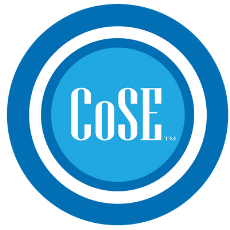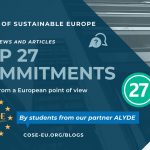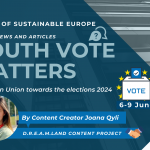Written by Natalie Chaar
Reading time: 8 minutes
Equal Opportunities for Disadvantaged Youngsters
The only weapon youngsters should be holding is education. But, is it fair for some youngsters to have the opportunity to get educated and pursue their dreams, while others struggle to live? When some kids worry about which major to study or which college to attend, others worry about how to survive in countries full of brutality. It is particularly unfair to those who have great potentials and ambitions but lack the key to their success, because of reasons out of their control.
The United Nations stated that: “Education is both a human right in itself and an indispensable means of realizing other human rights. As an empowerment right, education is the primary vehicle by which economically and socially marginalized adults and children can lift themselves out of poverty and obtain the means to participate fully in their communities”.
Some of the main countries that welcomed a large number of Syrian and Palestinian individuals were: Lebanon, Turkey, Iraq, Egypt, Jordan and European Countries. Thus, it is always important to look at the bright side of everything. For instance, a lot of Non-governmental Organizations (NGOs) were established to support these youths by empowering them psychosocially, protecting and educating them.

War Child Holland
As a member of the Circle of Sustainable Europe (CoSE) Natalie participated in a project done by War Child Holland, a NGO, to educate the Syrian and Palestinian refugees in Lebanon and grant them the opportunity to become educated and hopefully one day be able to rebuild their nations. War Child started in 1995 in The Netherlands, and is now active in sixteen countries around the world, including Jordan, Lebanon, Palestine, Syria, Afghanistan, Colombia, Ukraine, Germany, Sweden and The Netherlands. War Child Holland declared that: “Our education programs are designed with the long-term goal of building children’s academic, social and emotional knowledge and skills to be able to participate fully in their societies and realize their full potential.”
The children received non-formal education and in schools education by facilitators who worked hard to deliver student-centered, interactive, and straightforward lesson plans which were always reviewed and amended by experts in the field. The lesson plans revolved around the following main subjects: English, Arabic, Math and Sciences, as these subjects covered all levels until high school.
The team was made of but not restricted to: outreach officers, education technical officers, center supervisors, child protection officers, UNICEF, etc.. The members were always ready to receive constructive feedback from the parents and learners in order to cater better for their needs and always deliver quality education. The project was effective to an extent that facilitators and learners formed a great rapport based on respect and care from both sides.
The centers where the learning took place were distributed all around Lebanon, from the South till the North of the country. Each center was well-equipped to provide the students and facilitators all their needs. And children from different age ranges could register and receive the required educational level.
In addition, capacity building and weekly meetings took place between War Childs’ International Staff that were active in the other countries as well.
Success Stories
Every end of the month, facilitators made sure to share success stories with the team. This encouraged the members to work harder because of the positive impact they were making in these youngsters’ lives. Every member of this NGO worked hard to leverage their role in these educational programs to be an effective part of the change.
Also, success stories play an essential role as evidence to the funders that NGO is constantly making progress and achievements. Not only the funders were glad to hear success stories, but also the learners were influenced by others’ success stories, which made them keen to continue with the program and recommend it to other disadvantaged pupils like them.
Educational Equity
It is crucial to understand that generally, everything educators do is to aim for an educational equity amongst the highest number of students. Educational equity is when advantaged and disadvantaged youngsters receive the same learning outcome.
What is the main reason behind education? People seek education in order to lead a life full of accomplishments that grant them a prosperous life and a successful career in the future. Therefore, regardless of the socio-economic status, family background, nationality, or race of the youth, they have the right to be educated just like everyone else. Because War Child is one of the NGOs that believe in educational equity, they decided to establish these effective programs.
As a result of these programs, the youngsters might have the chance to travel and explore life in a new context, escaping the poor and violent life they face in their countries. There are other travel-focused associations that help and prepare disadvantaged people travel to other countries such as Europe in order to continue their studies and work there. George Washington once said: “Education is the key to unlock the golden door of freedom”. Don’t you think that every adolescent deserves the key to this golden door?
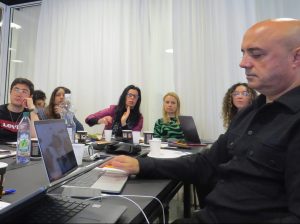
DREAMLAND Project Kick-Off Meeting Helsinki
Equal Opportunities for Carbon Neutrality
The European Union’s ambitious goal to achieve carbon neutrality by 2050 through the EU Green Deal is a significant step towards a sustainable future for all Europeans and an example globally. While this vision may appear to be a distant goal, it carries profound implications for disadvantaged youth, who often face additional barriers and challenges.
Disadvantaged youth, including those from marginalized communities, low-income backgrounds, or with limited access to education and resources, represent a vulnerable segment of the population. Their voices and experiences are essential to creating inclusive and equitable policies for a carbon-neutral Europe. Despite their potential, these young individuals often encounter substantial barriers:
- Limited Representation: Disadvantaged youth are often underrepresented in political institutions and decision-making processes, making it challenging for them to advocate for their needs.
- Educational Gaps: Many face educational disparities, limiting their access to information and their ability to understand the intricacies of the EU Green Deal and related policies.
- Economic Challenges: Economic hardships can hinder their participation in sustainability initiatives and hinder their opportunities to engage in civil society.
Project D.R.E.A.M.LAND is an Erasmus Plus Cooperation between Turkey, Italy, Belgium, Sweden, Slovenia, Finland, France and Republic of North Macedonia to make young people willing to participate actively in civil society and political life at local, national, and European scales.
The D.R.E.A.M.LAND project is specifically designed to tackle these challenges and empower youth. It acknowledges that the participation of these young people in political life and civil society is not just desirable but essential to achieving the 2050 Carbon Neutral Europe target.
In the context of disadvantaged youth, the D.R.E.A.M.LAND project seeks to:
- Amplify Representation: Advocate for increased representation of disadvantaged youth in decision-making bodies, ensuring their unique needs and perspectives are taken into account.
- Provide Access to non-formal Education: Offer educational programs and resources tailored to the needs of disadvantaged youth, fostering their understanding of sustainability and environmental issues in terms of online/offline materials e-guides, courses, research papers etc.
- Facilitate Economic Opportunities: Collaborate with organizations and initiatives to create economic opportunities for disadvantaged youth, allowing them to actively participate in sustainability efforts.
For more information about this project you can visit the website; D.R.E.A.M. LAND – Developing Routes of Europe’s future through non-formal learning with Active youth Members (dreamland-project.eu)
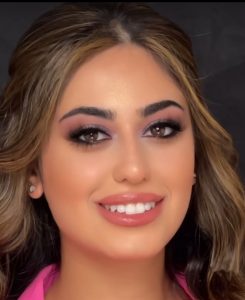
Natalie Shaar, a 24 years old educator who graduated from the American University of Beirut, with a Bachelor in Education; emphasis on English and Social Studies. Natalie worked in the field of Education in different countries for 3 years; as an Educator and as a vocal leader in the Education sector.
References:
View of Syrian Refugees Higher Education Crisis (ojed.org)
Providing education in conflict-affected areas | War Child (warchildholland.org)
About the right to education and human rights | OHCHR
